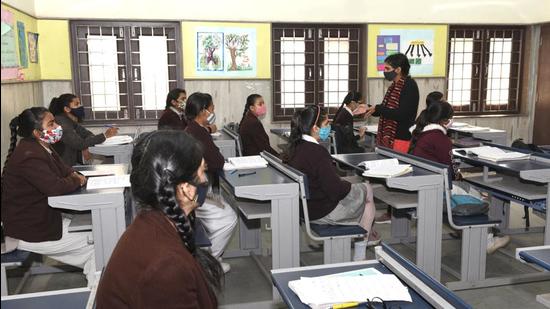Deshbhakti curriculum will be taught through activities, no formal exam
The Delhi government plans to launch the curriculum in public schools as soon as schools reopen.
A quick question-and-answer session as warm-up, followed by creative activities such as visualisation and self introspection, and opinion collection from outside classrooms to ”broaden one’s perspective” — that’s how the Delhi government will teach the ”deshbhakti curriculum” from this year to all students from nursery to Class 12. The evaluation will be done without the students having to take a formal exams, the education department officials said.

The Delhi government plans to launch the curriculum in public schools as soon as schools reopen. On Friday, the government announced that the governing council of the State Council of Educational Research and Training (SCERT) has adopted the framework for the curriculum.
Ahead of assembly elections in 2020, the Aam Aadmi Party in its manifesto promised to introduce deshbhakti curriculum in all Delhi government schools once elected to power. While presenting the annual budget in March, deputy chief minister Manish Sisodia announced that the deshbhakti curriculum will be introduced in the 2021-22 academic session.
According to officials of the education department, the curriculum is designed as a “set of activities” that are related to students’ day-to-day life. “The government has shortlisted several activities and the SCERT has adopted them. These activities will now be classified into different categories. Most of the activities are related to the daily lives of students with the purpose to make them more self-aware, self-confident, develop problem-solving approaches and make them socially responsible. That’s how they can contribute the most to the nation,” said a senior official, who asked not to be named.
For students enrolled up to class 8, there will be just a single period of deshbharkti curriculum daily, while the education department is yet to finalise the number of periods for those studying in classes 9 to 12, the official said.
According to an official document seen by HT, the lessons have been designed in five steps. For instance, the classes will begin with a warm-up question-and-answer session in order to spark student interest and involvement. This will be followed by activities that will aim to “accelerate children’s expression in class and engagement with the content”. “Activities such as visualisation, self-introspection, interpretation and creative exercises will be conducted to help students delve deeper into questions or issues raised in class discussions,” the document read.
As homework, the students will be asked to seek views and opinions of people around them — adults and acquaintances in order to “enhance the expanse of discussion and broaden student perspective”. “The final step will be introspection in which children will introspect and share what and how much they have learnt from the chapter. It will help deepen children’s learning and help them better understand their own thoughts and opinions,” the document added.
A member of the curriculum committee, who wished not to be named, said the pedagogy of deshbhakti curriculum will be similar to the happiness curriculum and entrepreneurship mindset curriculum launched by the Delhi government in 2018 and 2019, respectively. “Here, the idea is to convert values into actions and to make each child realise that every action of theirs represents their relationship to India and has an impact on the country. This will be done through activities, stories and discussion just like we have been teaching students how to be happy and how to develop entrepreneurship skills,” the member said.
At the end of the academic season, the students will be evaluated through self-assessment, peer assessment, and assessment by the teacher. “No formal examinations or grading system will be followed for the Deshbhakti curriculum. Emphasis will be on observing and assessing the development of the values, behaviours and actions of Deshbhakti amongst students on an ongoing basis,” the document added.




